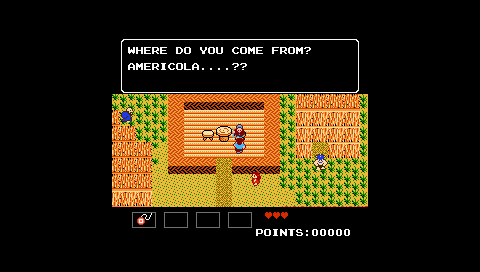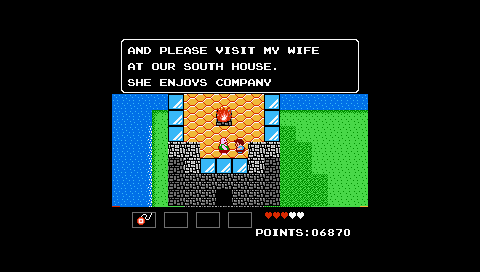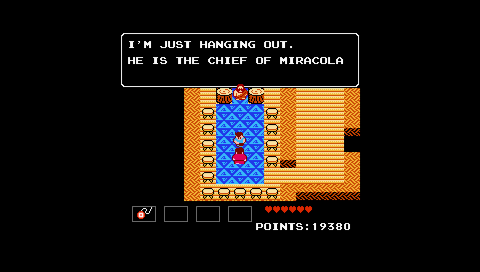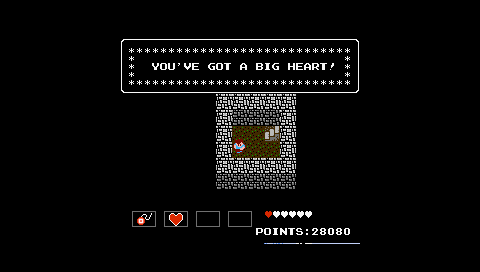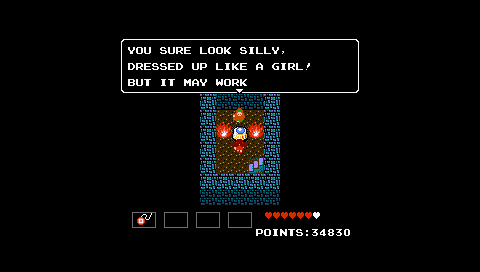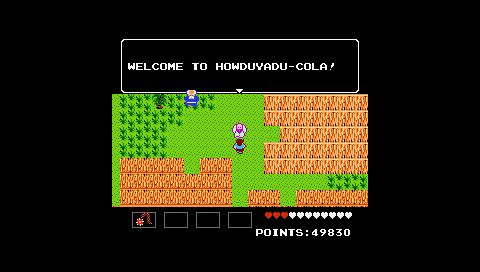What is The Commune?
We're a group of gamers, and we're always looking for new gamers to join us. Every month or so, we pick a game to play. We chat about the game together, and we record podcasts, record videos, and write essays. You can reach The Commune in the following ways:
- Register on the forums. This is where we organize events and pick games.
- Reach us by email at vgcommune *A*T* gmail *D*O*T* com.
(Close)
StarTropics Photo Diary
Written by
Daniel Primed
About the game
StarTropics
Posted on
Aug 20, 2016
Chapter One
I entered Dan for my file name, but they call me Mike...
Wonder what the big mystery is.
Rob the Robot reference.
General Comments
-the yoyo wind-up animation is similar to the "stickiness" of Link's sword in Zelda. It seems to be a bit slower.
-the fire balls have a slightly longer range than the yoyo
-you can jump on the spot to avoid the snake enemies
-you can only jump forward when jumping between the green blocks
-lots of simple, static switch puzzles
-red snakes: move forward in straight line when Mike is in their sight line
-slugs: crawl in straight lines slowly
-blue slugs: crawl in straight lines, sometimes pause between bursts of faster movement speeds
-hydra boss attack patterns are not predictable or player-dependent, have a "rawness"
Chapter Two
The secret path to the left was a bit easy to overlook.
General Comments
-lock-and-key prompts have the player criss-cross the island and introduce the player to the sub's functions
-dungeon is focused more on hidden passages and jumping over enemies as they approach you
-quite a step up in difficulty from the first dungeon
-not sure how the potion works or the snowman
-the octopus boss was pretty fun, although at first I assumed you had to use the baseball bat to hit back his projectiles, the purpose of some items as such is not so clear
-the range of the yoyo is good for continually attacking the boss
-probably the biggest contributor to the game's difficulty is that enemies rarely drop hearts
-I'm enjoying the act-based structure: bit of story and exploration, then a dungeon. It is like a linear, chapter-by-chapter Zelda
Funny NPC Speech
Chapter Three
The dungeon challenges get much more interesting in chapter 3. They make good use of the simple enemy behaviours, the player's abilities, and the room layout. For example, the snakes move forward in a straight line when you are within their sight range. To get past without getting hit, you have to lure them, jump, and have the two snakes pass underneath you at the same time. Then you can move back to the side and attack them when they revert back to the original positions.
Initially I couldn't figure this one out. The skeleton turkeys move too quickly and can plough through your yo-yo's hit-stun. You have to take advantage of the slight delay in their jumps when crossing the water channel. I like how the cross-shape plays into the demonic theme too.
This darkened room was another head scratcher. The idea is that you have to use the enemies' movement patterns (the octopus bounces across land tiles) to find a safe passage and avoid jumping into the water (which equals insta-death). The subtle change in presentation re-contextualises the enemy behaviour in a creative way. The idea behind the snake challenge is that the snake which moves one unit away from you reveals the pathway from which you can jump to. The other snakes are separated by a two-unit gap, which the player cannot jump over.
This boss fight is simple, but neat. The fireballs on the left and right sides rotate around the adjacent blocks (think topdown fire chains from Super Mario Bros). The boss fires homing projectiles. I like how the challenge changes as you move around the room (as you're required to do to activate the switches and beat the boss). Initially, you need to manage the two timers (rotating fireballs and projectiles; actually the projectiles have two timers: time of approach and buffer time between shots). As you move around the fireball, you're relative position to the boss (from which projectiles are fired) changes. Given the distance between you and the boss, you have enough time to react and the multiple timers provide a far, but tough challenge. As you move around the front of the boss, you need to focus more on the delay between shots as your reaction time is limited, so you'll want to be moving between blocks right as the boss is ready to fire a projectile. In this position, the fireballs are away from the player and have no bearing on the challenge. Crossing the horizontal stretch in front of the boss is probably the toughest challenge. You must take both fireballs into account as well as the projectiles. You're also quite close to the boss and therefore have a shorter reaction time. I also like how the top-left tile acts as a rest point between the first and second sections (as the boss cannot fire projectiles behind him). The clean tile-based design shines through in this challenge as it presents clear, distinguishable options for the player.
The subtle leading has been quite effective so far. For example, the blue gravestone here = entry to a dungeon. The hidden passages behind buildings, less so.
Not sure if this is the right screenshot, but the secret pathway to the right of the staircase...but of a doozy. Fortunately, I had a secret weapon called Greg.
Really liked this challenge too. There's enough spacing between projectiles that you can move one tile between shots. Details are where it's at.
You can jump and yoyo to the ground too, which is sweet.
The weapon needed to beat these enemies is in the previous room. You need to jump on some random tiles to unlock the mirror shield. If you miss it, well, you just gotta suck up that game over.
Chapter Four
Well that was short..
General Comments
-there's a moment of pause after your yoyo makes contact with an enemy, this allows you to better read the action and fit in extra attacks as the enemy is exiting hit-stun (?)
-there are more tracking enemies in the first dungeon than previously
-the monkeys and rows / column design stall out gameplay as you wait for them to bounce into range
-Chapter 3 is sooo big compared to the first two chapters
-the graveyard dungeon is a bit like the Lost Woods from Zelda
-I think they got the balance right with heart refills in the graveyard dungeon
Funny NPC Speech
Surprisingly down-to-earth comment.
Thanks.
Chapter Five
What happens if you put this one into the giant piano? Or is this just context for the main challenge?
I realised before that you can attack the bowling balls to stop them rolling, so this challenge wasn't as hard as I first thought.
Chapter Six
Does talking to Po earlier in the game elicit a different response?
This room is all about reading the single and double space gaps and looking for connections in the chain. It was surprisingly more challenging than I thought it'd be.
This boss is surprisingly similar to the octopus and serpent bosses in chapter one and two.
This boss is similar to the volcano boss. Mike's position in the capture is the ideal position as you're able to use the ninja stars to attack the two heads at the one time (effectively halving the combat time). However, it comes at the expense of reaction time. Splitting the ninja stars creates a complex timer (the incoming fire of the two projectiles, the delay between shots, and the time at which the ninja star projectiles need to be split). It's neat how your attack suspends forward and must be planned and executed around the spacing between the other two timers. If you're on either the left or right sides, the moving fire balls (which shield the cyclops' faces) are another timer that comes into play.
General Comments
-A lot was said in the podcast recording, so I'm quickly running out of things to say about this game.
-The mountain dungeon at the end of chapter three does some neat stuff with hidden passages and crumbling platforms.
-The ocean navigation leading up to the crater in chapter five overreaches a bit. I would prefer if the overworld stuff focused more on the cute story vignettes.
-The Aztec head boss isn't so different from some of the regular enemies, like the hand which pops up from underground.
Funny NPC Speech
The accurate use of slang throughout the game is pretty impressive for a NES game. I guess it's a result of this game being made specifically for the western market.
Chapter Seven
The red hot spots move towards Mike one unit at a time. The player has to read the information across the three rows to identify openings. This challenge is similar to the types of challenges in the earlier dungeons (than the shift in focus in Chapter Seven and Eight).
I enjoyed this boss (which has already been defeated in the screenshot). You need to jump between the platforms, face towards the boss and shoot. Higher level play = finding new strategies within your limited ability set. His red projectiles are also easier to make out and make the battle much cleaner than the regular enemies.
Maxing out the player's hearts forgoes the opportunity for players to scale the difficulty by choosing not to upgrade their health (akin to how some people try to complete Zelda games with 3 hearts). You can understand why they do it, though.
This confrontation takes place on a unit-wide horizontal platform. The boss fires green projectiles either level or at jumping height to Mike. They also fire red projectiles diagonally downwards at Mike. I thought the hit boxes of the red projectiles were a little odd as they would often fly through Mike's head and he wouldn't take damage. I like how you need to flick the initial switch and then go back to the entrance to release the right-hand side of the platform--an action which leaves you exposed for a period of time as your back faces the boss. I guess the idea of this boss is that you're meant to dodge two sets of projectiles and move forwards and backwards, and so the player's movement was intentionally limited. Yet I found the battle pretty easy because the red projectiles would miss me most of the time.
Chapter Eight
A brief shift to the side-scrolling perspective.
This room was harder than the final boss. You need to stand on the top most platform while it's closed and the energy rod barrier is down (it's up in the capture). Enemies spawn out of the other opening platforms. The lower two chutes pump out those starfish enemies which move towards you if you're in alignment (and you can't jump over them to avoid their attacks, which makes no sense). A robot enemy will pop out of the chute second away from the energy core. So long as you stand on the closest chute platform, you'll only have to deal with the robot enemy occasionally getting in your way. The main problem is that between fending off the spawn of robots and jumping off the chute platforms, the core will restore their health. I think that this challenge is quite cluttered (I'll talk more about it below).
You can mine for hearts from the conga line of infinitely spawning red alien bushes.
I wonder where this gag came from.
General Thoughts
-I think my interest in StarTropics peaked around Chapters 3-6. I lost interest in the last two chapters. I didn't think much of Chapter 7's first dungeon gimmick (finding your way through an interconnected space). It diverged from what I think makes StarTropics great, the tight challenges constructed around simple mechanics. The main robot enemies in Chapters 7-8 also fire projectiles which can be difficult to see because of their colour (green blends into the background, yellow is not well defined, light red with dark red outlines faired better) and the defined pipe-textured floor. The other problem is that these chapters equip the player with various projectile weapons which don't counter the enemy shots. As such, the projectiles can often crowd each other out, making it even more challenging to decipher the action on screen. This is especially the case when Mike is close to an enemy and the player has limited time to read and react to stimulus. I would either attack from a distance or try to catch them to the side. When there's several robot enemies, if I can't isolate one, I'll just try to plough on though and minimise the damage taken. Throw in those pink bike enemies that randomly spawn in and this portion of the game is quite cluttered.
-Chapter Seven, part two was much cleaner as the player isn't swamped with enemies and the game returns to its focused linear romp.
-Chapter Eight was surprisingly short and easy. The main challenge was dealing with the clutter in the side-scrolling and energy core sections.
-I was disappointed that the final boss was so easy. I beat it on my third attempt. You just need to keep your distance and fire off your supernova projectiles. If Zoda sends an enemy your way, it'll get wiped out in the cross-fire, so you only need to worry about the red projectiles, which he doesn't seem to send out much.
-Chapters 7-8 could have been an Aliens video game adaption.





